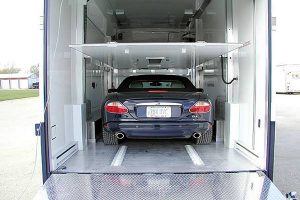Understanding The Basics Of Car Shipping
Shipping a car during a move can be an intricate process, but understanding the basics can make the experience smoother and less stressful. At its core, car shipping involves transporting your vehicle from one location to another using specialized services. These services range from open-air carriers, which are more economical and commonly used, to enclosed carriers that provide additional protection for high-value or classic cars.
The first step in shipping a car is selecting a reputable auto transport company. This choice is crucial because it affects not only the cost but also the safety and reliability of the move. Look for companies with strong customer reviews, proper licensing through organizations like the Federal Motor Carrier Safety Administration (FMCSA), and appropriate insurance coverage.
Timing is another critical factor in car shipping. Generally, you should book your shipment several weeks in advance, especially if you’re moving during peak seasons like summer or around holidays when demand is high. The timing will also influence costs; expedited services will naturally incur higher fees compared to standard timelines.
Understanding different pricing components can help you budget effectively. Costs depend on factors such as distance traveled, type of carrier chosen (open or enclosed), vehicle size and weight, and current fuel prices. Additional services like door-to-door delivery versus terminal-to-terminal drop-off can also impact overall expenses.
Preparation of your vehicle is another essential aspect of car shipping. This involves cleaning your car inside and out to ensure it’s free from dirt that could obscure pre-existing damage during inspection. Removing personal items not only reduces weight but also minimizes risk since most transport companies are not liable for personal belongings left inside the vehicle.
By grasping these fundamental aspects—selecting a reliable company, understanding timing implications, budgeting accurately based on various factors, and preparing your vehicle appropriately—you’ll be better equipped to navigate the complexities of shipping a car during your move efficiently and effectively.
Comparing Different Car Shipping Methods
When planning to ship a car during a move, understanding the different shipping methods can significantly impact both cost and convenience. The two primary methods are open transport and enclosed transport, each offering unique advantages depending on your needs.
Open transport is the most common and cost-effective method. It involves placing your vehicle on an open-air trailer, similar to those seen delivering cars to dealerships. This option is widely used due to its affordability; however, it does expose the vehicle to weather elements and road debris. For many, the slight risk of minor cosmetic damage is worth the savings.
In contrast, enclosed transport offers a higher level of protection by housing the vehicle inside a fully covered trailer. This method is particularly advantageous for luxury, classic, or high-value cars that require extra care during transit. Though more expensive—sometimes costing up to 60% more than open transport—the added security against potential damage from external factors makes it a preferred choice for valuable vehicles.
Another factor influencing cost and method choice is door-to-door versus terminal-to-terminal shipping. Door-to-door service provides maximum convenience by picking up and delivering your car directly at specified locations but comes with a higher price tag due to personalized service levels. Terminal-to-terminal shipping requires you to drop off and pick up your car at designated locations, which can lower costs but adds logistical challenges.
Additionally, timing plays an essential role in deciding which method suits you best. Expedited shipping services are available for urgent moves but come at a premium price compared to standard delivery times.
Ultimately, comparing these methods involves balancing budget constraints with your vehicle’s value and condition alongside personal convenience requirements. Carefully evaluating these aspects ensures that you select a car shipping method tailored precisely to your moving needs while optimizing both cost efficiency and peace of mind.
Calculating The Cost Of Shipping A Car
Calculating the cost of shipping a car during a move involves multiple factors, each contributing to the final price. One of the primary considerations is the distance between the pickup and delivery locations. Generally, longer distances increase overall costs, but they may reduce the cost per mile due to economies of scale. For instance, shipping a car across state lines will typically be less expensive per mile than transporting it coast-to-coast.
Another significant factor is the type of vehicle being shipped. Larger and heavier vehicles such as SUVs and trucks usually incur higher shipping fees compared to compact cars because they take up more space on transport carriers and weigh more, which can impact fuel consumption and carrier capacity. Additionally, modifications or non-standard dimensions can further elevate costs.
The method of transport also plays a crucial role in pricing. Open carriers are more commonly used and are generally less expensive than enclosed carriers. However, enclosed carriers offer greater protection against weather elements and road debris, making them ideal for luxury or classic cars despite their higher cost.
Seasonality can influence shipping prices as well. Demand for auto transport services tends to peak during summer months when many people relocate or take vacations, leading to higher prices due to increased demand. Conversely, winter months might offer lower rates but could come with delays due to inclement weather conditions.
Lastly, additional services such as expedited shipping or door-to-door delivery will add to your overall expenses. Expedited services ensure quicker delivery times but come at a premium price. Door-to-door delivery offers convenience by picking up and dropping off your vehicle at specified addresses rather than terminal locations but also incurs extra charges.
By understanding these variables—distance, vehicle type, transport method, seasonality, and additional services—you can better estimate your car shipping costs and plan accordingly for a smooth transition during your move.
Factors That Influence Car Shipping Costs
Shipping a car during a move involves several cost considerations that can vary widely based on multiple factors. One of the primary influencers is the distance between the origin and destination. Naturally, transporting a vehicle across longer distances will incur higher costs due to fuel, labor, and time expenses. However, the route itself plays an equally significant role; routes with fewer stops or more direct paths often cost less compared to those requiring multiple detours or traversing through less accessible areas.
Another critical factor is the type of vehicle being shipped. Larger vehicles such as SUVs or trucks generally cost more to transport than smaller cars due to their size and weight, which may necessitate specialized equipment or additional space on the carrier. Similarly, luxury or vintage cars might require enclosed transportation for added protection against weather elements and road debris, further increasing costs.
Seasonality also impacts car shipping prices. During peak moving seasons like summer months or around holidays, demand for car shipping services surges, leading to higher prices. Conversely, off-peak times may offer more competitive rates as companies seek to fill their carriers.
The level of service chosen can significantly affect costs as well. Standard shipping services are typically less expensive but may involve longer transit times compared to expedited options which guarantee quicker delivery at a premium price. Additionally, door-to-door service is usually pricier than terminal-to-terminal service where you drop off and pick up your vehicle at designated locations.
Insurance coverage provided by the shipping company is another consideration; while basic coverage is often included in quotes, opting for enhanced coverage offers peace of mind but comes at an additional cost.
By understanding these influencing factors—distance and route specifics, vehicle type, seasonal demand fluctuations, service levels offered, and insurance options—you can make informed decisions that balance both your budgetary constraints and logistical needs when shipping your car during a move.
Tips For Preparing Your Car For Shipment
When preparing your car for shipment during a move, there are several critical steps to ensure a smooth and hassle-free experience. First, it is important to clean both the interior and exterior of your vehicle. A clean car allows you to conduct a thorough inspection for any pre-existing damage, such as scratches, dents, or paint chips. Documenting these with photos and notes can be invaluable if any disputes arise regarding the condition of your car upon delivery.
Next, remove all personal items from the car. Shipping companies typically prohibit transporting personal belongings inside the vehicle due to safety regulations and insurance limitations. Additionally, loose items can shift during transit, potentially causing damage.
Another key preparation step is to check for any leaks or mechanical issues. Ensure that your car is in good working order before shipping it; this includes checking fluid levels and tire pressure. Most shipping companies require that cars be operable for loading and unloading purposes.
It’s also recommended to disable any alarms to prevent them from going off during transit. An unexpected alarm can cause unnecessary complications and delays.
Reducing the amount of fuel in your tank is another crucial consideration. Generally, having about a quarter tank of gas is sufficient for loading and unloading purposes while minimizing excess weight.
Moreover, secure or remove any custom accessories or modifications such as spoilers, bike racks, or antennas that could be damaged during transport.
Lastly, ensure you have all necessary documentation ready before shipment day arrives. This usually includes proof of ownership (like a title or registration), insurance details, and possibly an inspection report provided by the shipping company.
By following these preparatory steps diligently, you contribute significantly toward ensuring that your vehicle reaches its destination safely and without issues—making one less thing to worry about in the midst of your move.
Choosing A Reliable Car Shipping Company
Choosing a reliable car shipping company is a critical step in ensuring your vehicle arrives safely and on time during a move. The process begins with thorough research to identify companies with solid reputations. Start by seeking recommendations from friends, family, or colleagues who have previously shipped their cars. Additionally, online reviews and ratings on platforms such as the Better Business Bureau (BBB), Google Reviews, and specialized auto transport forums can provide valuable insights into the experiences of past customers.
Once you have a shortlist of potential companies, delve deeper into their credentials. Verify that they are properly licensed and insured. In the United States, for example, legitimate car shipping companies should be registered with the Department of Transportation (DOT) and possess a valid Motor Carrier (MC) number. This registration ensures compliance with federal regulations designed to protect consumers.
Customer service quality is another crucial factor to consider. Reach out to each company on your list to gauge their responsiveness and willingness to address your concerns. A reliable company will provide clear answers about their services, costs, insurance coverage, and delivery timelines without employing high-pressure sales tactics.
Requesting multiple quotes is an essential step in this process. Be wary of prices that seem too good to be true; extremely low bids may indicate subpar service or hidden fees that could surface later. Instead, look for competitive rates that align closely across reputable providers.
Lastly, inquire about the specifics of their shipping procedures—such as whether they offer door-to-door delivery or terminal-to-terminal services—and any additional protections they provide for your vehicle during transit. By carefully evaluating these elements and trusting only well-reviewed professionals who meet regulatory standards, you can make an informed decision that prioritizes both cost-effectiveness and peace of mind when shipping your car during a move.
What To Expect During The Car Shipping Process
When shipping a car during a move, understanding the process can alleviate much of the stress and ensure that your vehicle arrives safely at its destination. The car shipping process begins with selecting a reputable auto transport company. Researching customer reviews, comparing quotes, and verifying credentials are crucial steps in finding a reliable service provider.
Once you’ve chosen a transporter, you’ll need to schedule the shipment. This involves providing details such as the make and model of your vehicle, pick-up and drop-off locations, and preferred dates. Be prepared for some flexibility in scheduling as transport companies often work within broad time frames due to variables like weather conditions and traffic.
Before your car is picked up, it will undergo an initial inspection. This is usually conducted by the driver or an agent from the shipping company who will document any existing damage through photographs and notes. It’s advisable to be present during this inspection to ensure all details are accurately recorded.
During transit, your vehicle may be transported on an open or enclosed trailer depending on your choice and budget. Open trailers are more common and less expensive but expose vehicles to external elements like weather and road debris. Enclosed trailers offer more protection but come at a higher cost.
Communication with the transport company is vital throughout this period. Most companies offer tracking services allowing you to monitor your vehicle’s progress online or via phone updates.
Upon arrival at the destination, another thorough inspection will be conducted before you take possession of your car. Compare this final report with the initial one to ensure no new damage has occurred during transit. If discrepancies arise, document them immediately and contact the transport company’s customer service for resolution.
By familiarizing yourself with these steps, you can navigate the car shipping process more confidently, ensuring that one key aspect of your move is handled smoothly and efficiently.







